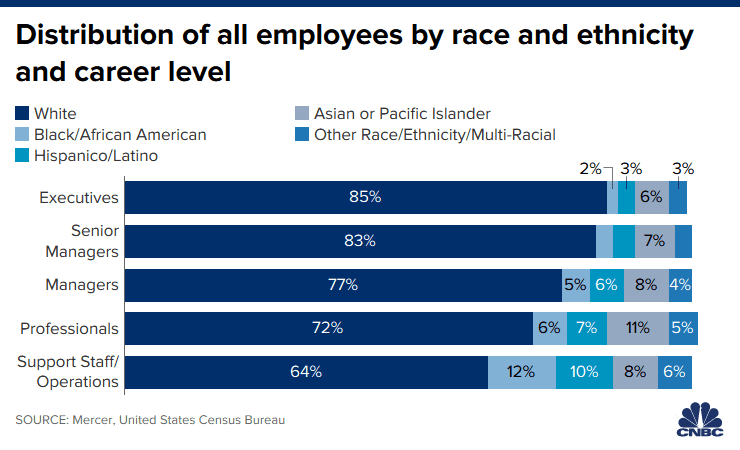In today’s climate, if you aren’t considering diversity, equity, and inclusion in the workplace, your business is behind the times.
Employee retention relies heavily on inclusion in the workplace. An organization that doesn’t truly value its employees’ ideas, presence, and contributions can be emotionally and mentally draining.
Often, “tokenism” is described as diversity without genuine inclusion. An inclusive workplace is defined by more than just the presence of diverse individuals. It’s a workplace where diverse individuals are engaged, developed, empowered, and trusted.
This article will go over why diversity, equity, and inclusion matter in the workplace.
Why does diversity matter?
The word diversity encompasses more than just racial diversity. The concept of diversity can also pertain to hiring people from various genders and gender identities.
For modern businesses, gender diversity should be a top priority. From top to bottom, gender inclusion will promote women’s participation and representation in the business and technical communities. Unfortunately, the reality is that there’s a large pool of cisgender and transgender females being overlooked regularly.

But when we say diversity, we usually refer to racial diversity. Failure to diversify your company may result in negative PR consequences and higher turnover among employees. These companies may also be less likely to attract and hire top workers since so many modern business professionals value diversity in the workplace.
However, a broadly diverse workforce or management team cannot always guarantee success. Therefore, diversity is a subject that employers and employees alike should be educated on. It can even be something as simple as learning how to write diversity-conscious emails.
When sending internal emails, make sure to use the right wording to include everyone in terms of race, sexual orientation, disabilities, etc. Here are some email templates to get you started.
Why does equity matter?
If you thought equity and equality were the same things, you’d be mistaken.
In fact, the pursuit of one can at times be directly contradictory to the pursuit of the other. A definition of equality is that all people are equal, especially in matters of status, rights, and opportunities.
Fairness and impartiality are qualities of equity that are defined as justice per natural law. In other words, you might not be “fair” if you treat everyone the same.
When you aim for equity, everyone gets an equal chance to succeed.
To create successful company policies and workflows that effectively address issues of gender, race, sexual orientation, language, and disability, you must be purposefully conscious of equity.

When selecting sales management software for your business and team, make sure that everyone on your team will be able to use it. If not, make sure to provide the team with training to bring them up to speed.
A few intentional steps are required to create a climate that promotes equal opportunities, such as providing gender-neutral restrooms, ensuring diverse interview panels, and removing discriminatory handbooks. While a workplace that fosters a culture of equality may take a while to implement, the result is well worth the wait.
You want to create a brand that not only supports but demonstrates strong equity. Companies that value equity are more likely to attract talent, keep employees longer, and create a diverse workforce with different points of view. With equitable practices, you’ll provide a successful future for your company and make workplace equality a reality for all.
Why does inclusion matter?
Diversity and inclusion are often used interchangeably, but they are both implemented in very different ways. Inclusion means working with people of color, women, disabled, and LBGT individuals to unlock their talents and develop them into valuable business associates.
The definition of diversity is including or involving people from a range of different social and ethnic backgrounds and of different genders, sexual orientations, etc.
Inclusion means the practice of providing equal access to opportunities and resources for people who might otherwise be excluded or marginalized, such as those who have physical or mental disabilities and members of minority groups.
Put simply, diversity means hiring a variety of people, and inclusion means making them feel comfortable with your company.
An important aspect of managing your employees is making them feel included, heard, and valued.
In inclusive workplaces, employees can express themselves comfortably, utilize flexible working patterns, maintain their work-life balance, and perform their best for the company.
By implementing diversity paired with inclusion, you’re more likely to recruit talented individuals and to have engaged and loyal employees. Despite diversity’s importance all on its own, a diverse workforce will still feel overlooked if inclusion isn’t provided. When employers support inclusion in the workplace, employee engagement goes up, and the turnover rate goes down.
Equality for everyone
To make your workplace an equal one, education is essential.
A more diverse workplace can lead to better innovation, problem-solving, and growth for companies. Diversity, equity, and inclusion in the workplace promote employee engagement, healthier workplace cultures, and a better sense of community among employees.


